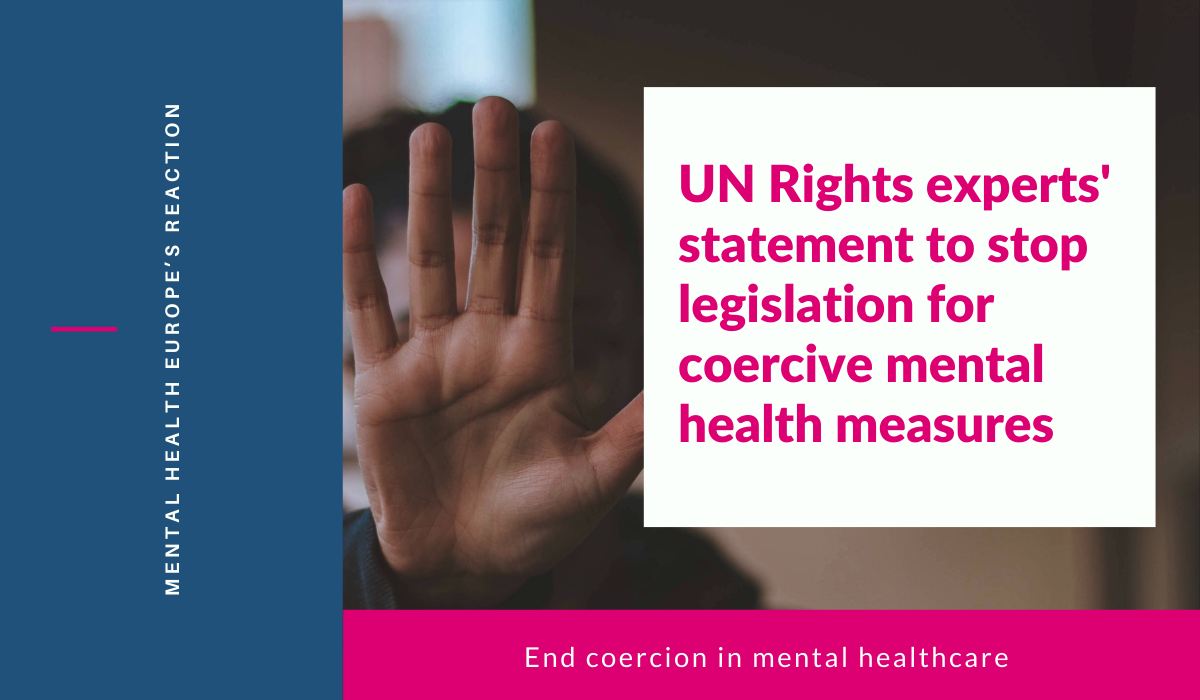UN experts: Stop legislation for coercive mental health measures in Europe

On Friday 28th of May, UN human rights experts have renewed their joint call to stop the Council of Europe to adopt legislation for coercive mental health measures. The Council of Europe’s Committee on Bioethics is scheduled to meet on 1 and 2 June to vote on the draft Additional Protocol to the Oviedo Convention. The draft Additional Protocol would continue to allow all the 47 State parties of the Council of Europe to use coercive measures, including forced treatment and involuntary placement in psychiatric institutions, against people with mental health problems.
Jointly signed by the Committee on the rights of persons with disabilities, the special Rapporteur on physical and mental health, the special Rapporteur on the rights of persons with disabilities, the special Envoy of the Secretary-General on Disability and Accessibility and the independent Expert on the enjoyment of all human rights by older persons, the call states that “overwhelming evidence from the European Disability Forum, Mental Health Europe and other organizations and growing consensus within the United Nations including at the World Health Organization, show that forced admission to medical institutions and coercive treatments in institutions will bring harmful effects such as pain, trauma, humiliation, shame, stigmatisation and fear to people with psychosocial disabilities,”.
“When there are efforts worldwide to reform mental health policy, it comes to our surprise that the Council of Europe, a major regional human rights organization, is planning to adopt a treaty that would be a setback to reverse all positive developments in Europe and spread a chilling effect elsewhere in the world,” the experts said.
“The coercive approach to mental health is doing harm to people with disabilities and we should not go backwards to authorize this outdated approach. People with psychosocial disabilities have the right to live in the community and to refuse medical treatment.”
The controversial draft treaty has aroused opposition within Europe and from the international community. Voices within the Council of Europe, such as the Council of Europe’s Parliamentary Assembly and the Council of Europe’s Commissioner for Human Rights have also been vocal against the draft Protocol.
“The Council of Europe now has a unique opportunity to shift away from old-fashioned coercive approaches to mental health, towards concrete steps to promote supportive mental health services in the community, and the realization of human rights for all without discrimination on the grounds of disability. We urge the Council of Europe to be part of the future and not part of the past in mental health,” they stressed.
“We call upon all State delegations to object to the draft Additional Protocol in the upcoming meeting and we urge the Council of Europe to end legitimising forced institutionalization and the use of coercion against persons with disabilities, including older persons with disabilities,” they added.
On Tuesday 1st and Wednesday 2nd of June, an MHE delegation will attend the plenary meeting of the Committee of Bioethics working on the draft protocol and remind the Committee composed of States representative of the serious impact the adoption of this protocol would have on the lives of persons with psychosocial disabilities and anyone experiencing mental health problems.
Over the past years, Mental Health Europe and partner organisations have been calling the Council of Europe to withdraw a draft protocol that reinforce legislations allowing involuntary treatment and placement in psychiatry. Join the campaign led by the European Disability Forum (EDF) and Mental Health Europe (MHE).
Further information:
Stay connected
Get our latest news, personal stories, research articles, and job opportunities.

